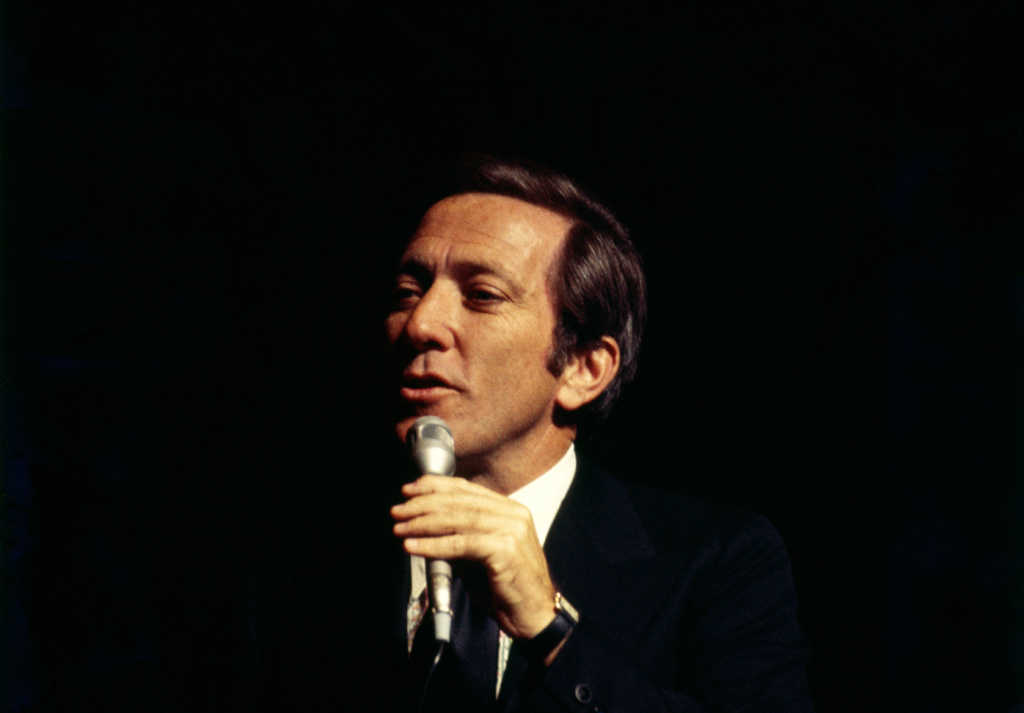Kanye West aside, not many high-profile singers in today’s culture take time to sing songs about Jesus. But that wasn’t always the case.
Over his career, Andy Williams sold more than 100 million records. President Ronald Reagan called the beloved tenor’s voice “a national treasure.” And when Christmastime begins, the crooner’s holiday songs are heard on just about every radio station from one side of the country to the other.
Raised in a strict Presbyterian home, Williams was certainly exposed to the truths of the Bible. I’m not under the impression he lived an entirely flawless life dedicated to the Lord, despite his clean family image, but there’s no doubt the lessons he was taught as a child — the faith he was raised to cling to — influenced the songs he sang with his signature ease.
Williams came from an era altogether different from the today’s culture. Over the course of his career, the “Moon River” singer recorded 43 albums, 15 of which have been gold certified and three of which are platinum. Though he was a Republican and close friends with Reagan, the entertainer, who passed away in 2012, sang “The Battle Hymn of the Republic” during a memorial service for Robert F. Kennedy — whom he also considered a friend — at St. Patrick’s Cathedral in New York in 1968. As his powerful performance rang out through loudspeakers outside the church, thousands of mourners joined in. Williams later said singing for RFK’s funeral was “the hardest thing I’ve ever done.”
No matter his foibles, faith played an invaluable role in Williams’ life.
My friends and family have always called me “an old soul,” so when the holidays come around, my Christmas playlists are full of songs from a bygone era performed by singers, like Williams, whose crooning styles require no autotune and whose melodies are, to many people my age, difficult to appreciate.
The difference, though, is more than stylistic. Listening to the holiday songs of yesteryear, it’s difficult to miss the message: these singers weren’t shy about the meaning of Christmas and the reason it’s celebrated at all. Their songs weren’t just bold in their acknowledgment of the Savior, many of them journeyed through the entire story of the Gospel.
One such example is Williams’ version of “Sweet Little Jesus Boy,” a Christmas song composed by Robert MacGimsey and published in 1934. The ballad, boasting a style similar to many African-American spirituals, tells the biblical story of redemption:
Sweet little Jesus boy
They made you be born in a manger
Sweet little holy child
We didn’t know who you were
Didn’t know you’d come to save us, Lord
To take our sins away
Our eyes were blind, we could not see
We didn’t know who you were
You have shown us how
We are trying
Master, you have shown us how
Even when you were dying
It just seems like we can’t do right
Look how we treated you
But please, Sir, forgive us, Lord
We didn’t know it was you
Sweet little Jesus boy
Born long ago
Sweet little holy child
And we didn’t know who you were
Williams released the faith-based song on October 14, 1963, on his record, “The Andy Williams Christmas Album,” which became the first of eight holiday albums.
As for the song, “Sweet Little Jesus Boy,” MacGimsey, who was white, wrote it in hopes of preserving the musical stylings of African-American folk music from the South. He wanted to echo the plea of black Christians living through the Civil War era. Once asked about the simple ballad, MacGimsey replied, “This is not so much a song as just a meaning. You have to imagine an aging [black man] standing off in the middle of a field just giving his heart to Jesus in the stillness.”
It’s difficult for me to imagine an entertainer whose fame today equals Williams’ spectacular stardom then performing a song so unapologetic in its adoration of Jesus and humble in its reflection on humankind. But in 2019, that’s perhaps exactly what we need — to acknowledge God “in the stillness.”
When I listen to Williams sing “Sweet Little Jesus Boy,” I can’t help but feel that stillness — a holy calm in the midst of our cultural chaos. We need a resurgence of that kind of music, songs that beckon to us, urging us to remember the reason we celebrate. And until that happens, I’ll keep listening to Williams.



